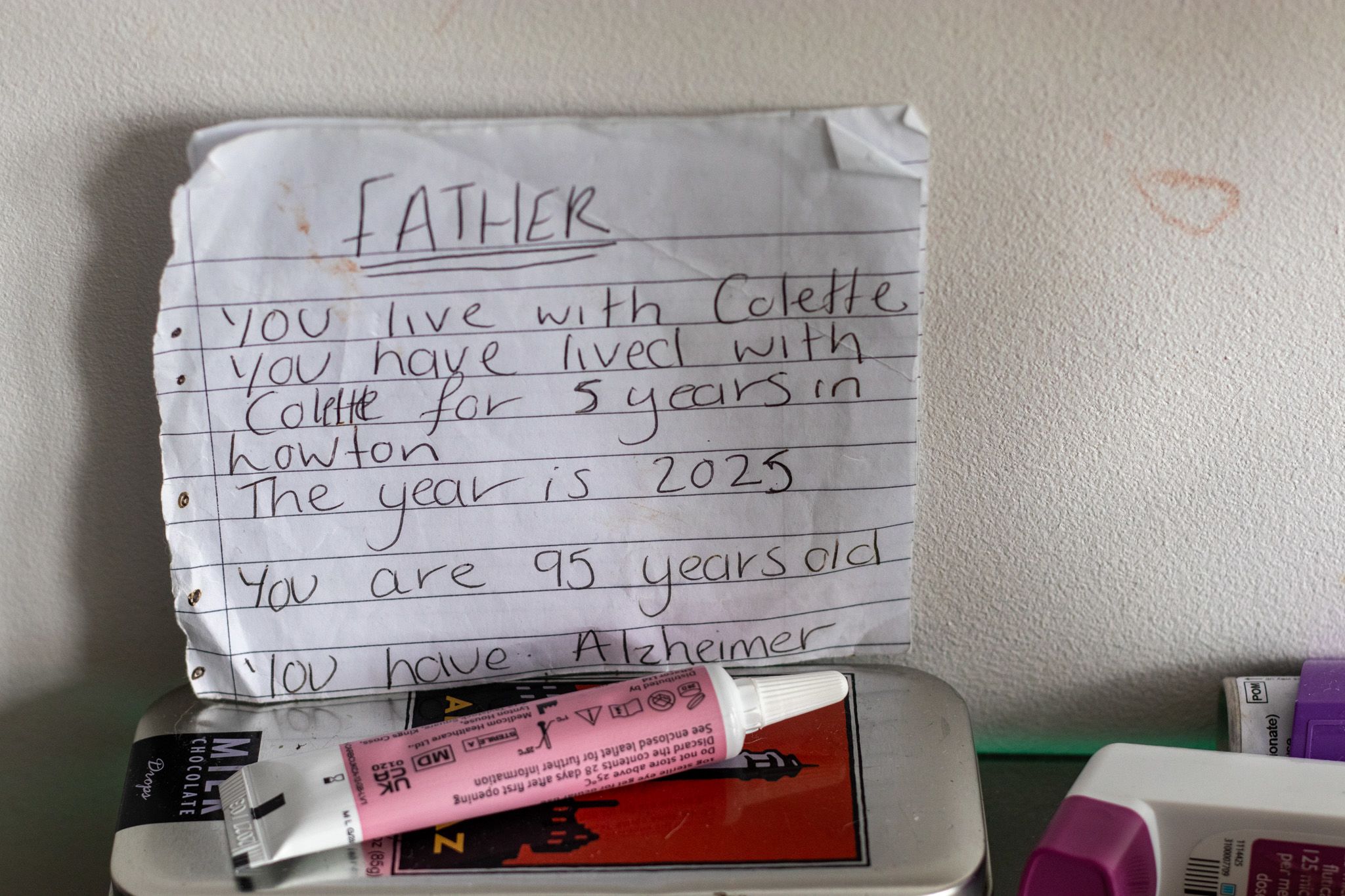The Carers Who Never Get a Break

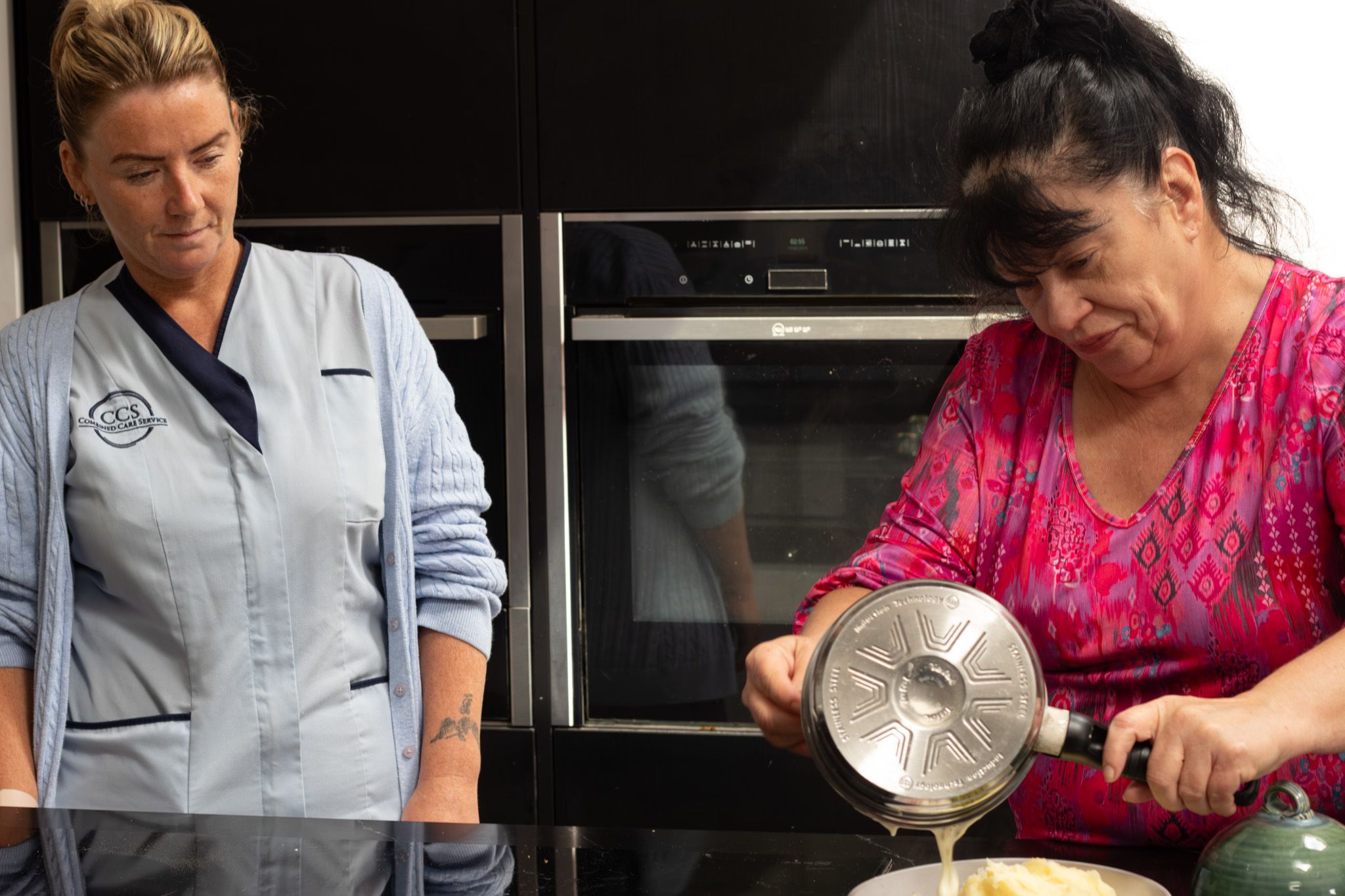
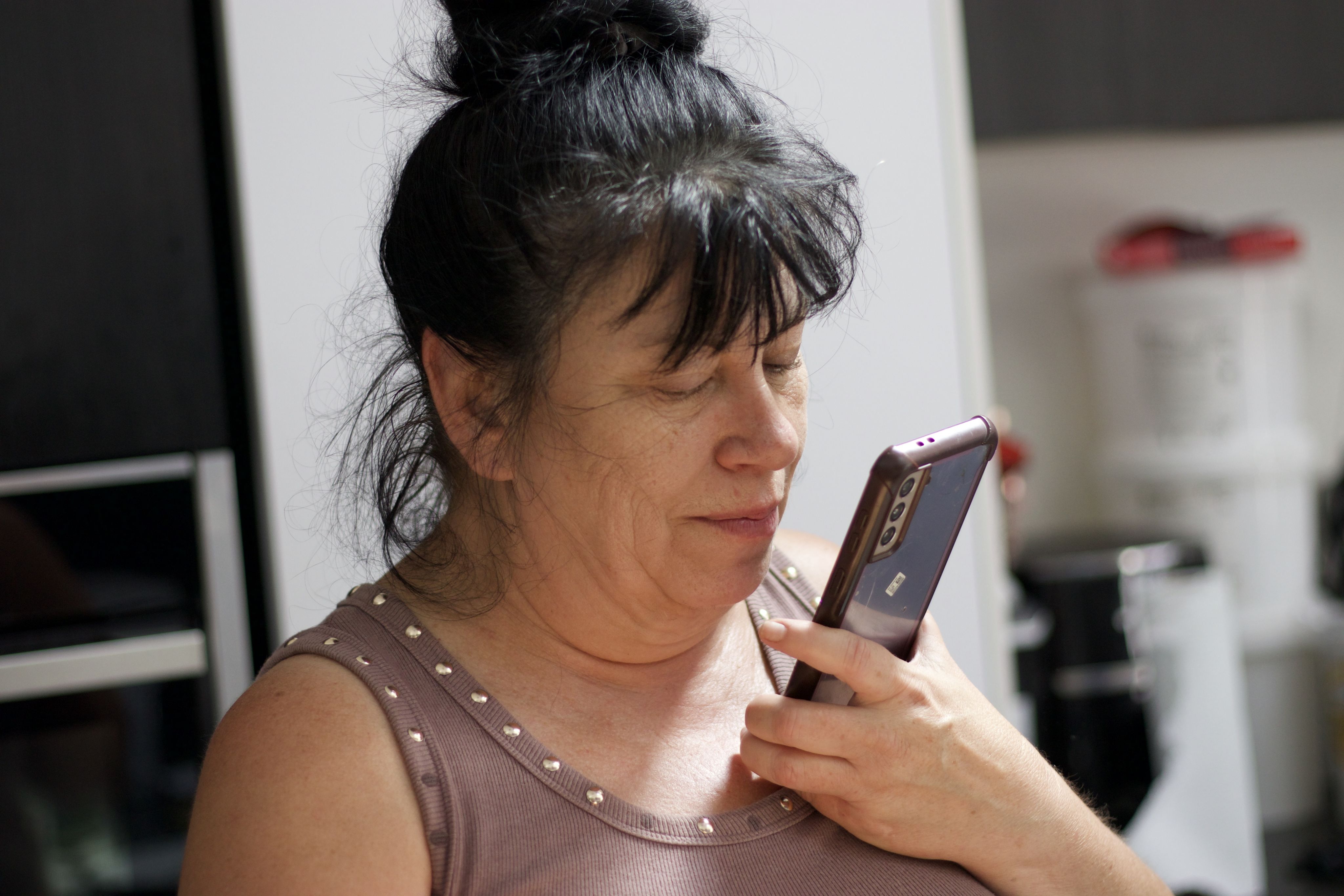
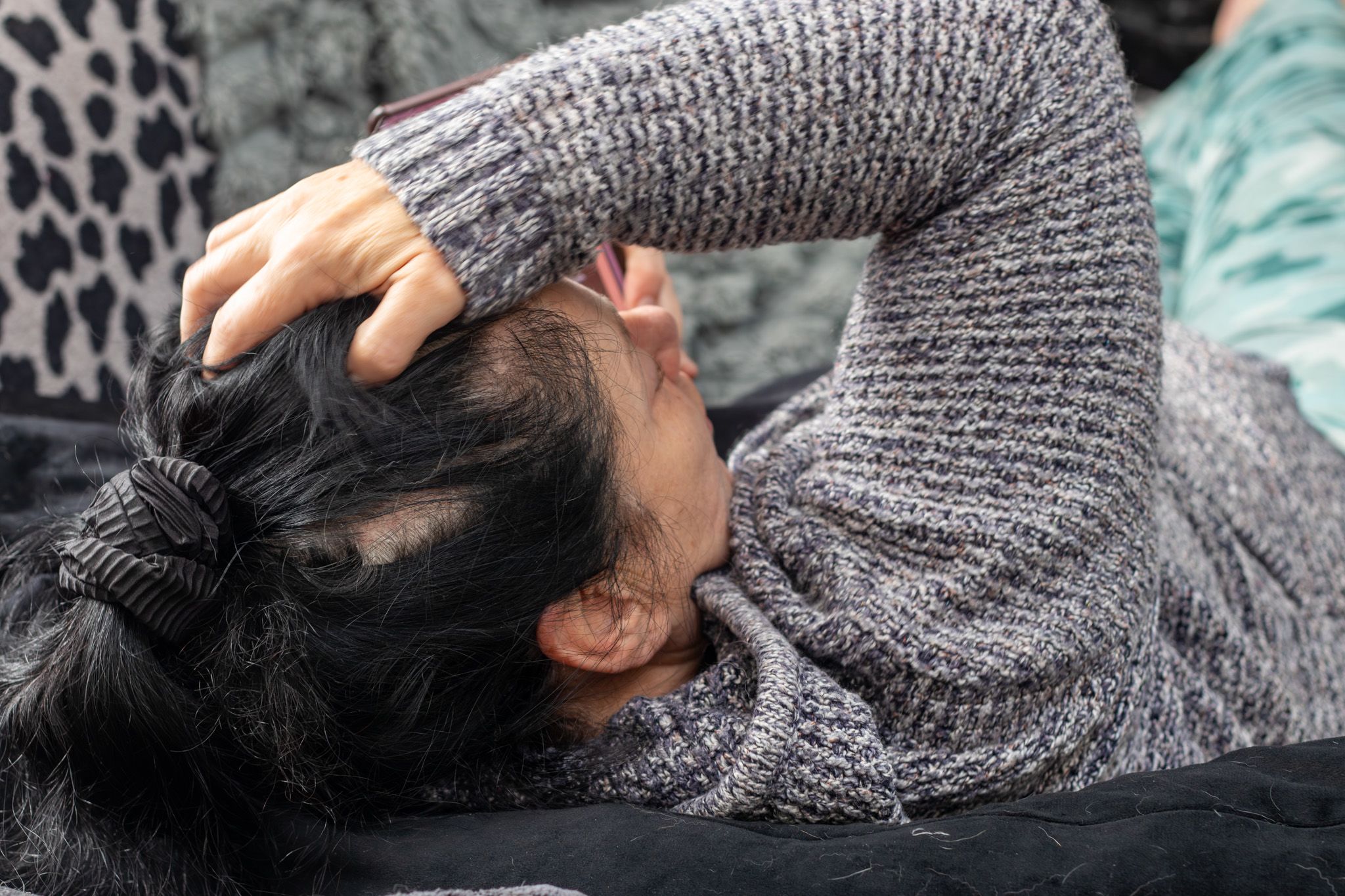
Across the UK, 5 million unpaid carers provide essential round-the-clock support for loved ones.
Colette cares for her uncle full time, juggling calls, appointments, and daily care.
Like most carers, she has no legal right to time off, leaving her exhausted and overwhelmed.
Colette collects herself on the sofa, cushions sinking beneath her. Her phone is still warm from hours of calls to agency after agency. “Respite literally happens here now,” she says, pointing to the sofa. “Which is sad, really.”
Cooking, cleaning, managing medications, the checklist never ends. A call to the bank drags on for more than an hour. “You’re constantly repeating why you’re on the phone, what you need, what questions they have,” she says.
Since Covid-19, Colette has cared for her 96-year-old uncle, a former Franciscan Friar with Alzheimer’s, cancer, and heart failure. “I didn’t even think about it,” she says. “I loved him, and he needed looking after.”
Full-time caring means meeting his needs: “stimulating his mind, washing his clothes, keeping him clean, feeding him, dealing with his frustrations,” or simply “listening endlessly to his repetitiveness.” Being a carer, she says, is being “their whole support network, emotional and physical all rolled into one.”
Colette helps her uncle with his morning exercise routine.
Colette helps her uncle with his morning exercise routine.
By 2 PM she has been up since early morning, moving between her uncle’s room, the kitchen and the sofa. She answers calls on speakerphone while sorting tablets, cooks while the breakfast dishes pile up, and catches only a few minutes rest before the next interruption.
A handwritten note in her uncle’s room reminds him who Collette is and that he has Alzheimer’s.
A handwritten note in her uncle’s room reminds him who Collette is and that he has Alzheimer’s.
A Hidden Crisis
Like Colette, millions of unpaid carers across the UK are reaching breaking point. The exhaustion, anxiety, and relentlessness of being needed every hour of every day slowly wear them down. Respite care, the lifeline that allows carers to rest and reclaim part of their own lives, is shrinking fast. Many services closed during the pandemic and never reopened, leaving carers without support, even as demand has surged.
In 2020, Carers UK reported that 38% of carers had to provide more support because local services were reduced or closed. Between 2019-20 and 2020-21 in England, the percentage of carers receiving respite or similar support for the person they care for fell from 12.2% to 8.5%, indicating a significant drop in support following service reductions.
Katy Styles, who founded the campaign group We Care, explains that respite for unpaid carers has decreased not only due to closures but also because of "financial cutbacks and a lack of trained staff and a focus on other areas has led to respite being cut." She points out that many carers managed without support during Covid and are now struggling to regain what they lost, while still lacking proper services.
Unpaid care now saves the UK an estimated £184.3 billion each year, almost equivalent to the cost of running the NHS in England. But this vital contribution has a steep personal cost. The Care Act 2014 gave local authorities a duty to assess carer's needs, including access to respite. Yet, after years of cuts and stretched services, many of these legal duties remain unmet.
Exhaustion
Before caring for her uncle, Colette led a fast-paced life, running multiple catering businesses and thriving on challenges it posed. “It was busy and chaotic,” she recalls. “I miss the mental stimulation, the people.” Surrounded by colleagues who listened and understood, her world was full of connection and meaning.
Then came Covid-19, Colette was already supporting her uncle part-time, but when the virus hit, she couldn’t bear to risk catching it. She gave up work, and he moved in fully, and she became his sole carer. “Then I had to face the carers’ system and everything that comes with it,” she says. “Honestly, it's just insane.”
Recently diagnosed with kidney disease, she struggles to keep up with her uncle’s needs. “I crawl to the bathroom,” she explains, an image of the effort it takes just to get ready before tending to him.
Styles notes that whilst the number of carers hasn’t increased dramatically, the intensity has. The 2021 Census recorded around 5 million unpaid carers in England and Wales, but ONS estimates suggest between 5.6 and 10 million with more people than ever are providing 50+ hours of care a week. “ONS only measures up to 50+ hours,” Styles explains, “but in reality many carers are providing care 24/7, managing multiple conditions and often end-of-life care at home.”
The emotional load is just as heavy, a maze of doctors’ appointments and conversations she cannot share. “I don’t tell him because he won’t understand… If I do, he’ll worry, then forget. And if I don’t, he’ll worry about something else, and then forget what he was worrying about.”
Colette suffers from constant fatigue, and sometimes even walking across the room feels painful. By mid-afternoon, she has already been awake since the early hours, with many hours slipping by in a blur of cooking, cleaning, managing medication, and answering phone calls. She might catch a brief nap on the sofa, but it’s quickly interrupted by a new notification or message. For Colette, moments of silence are few and far between.
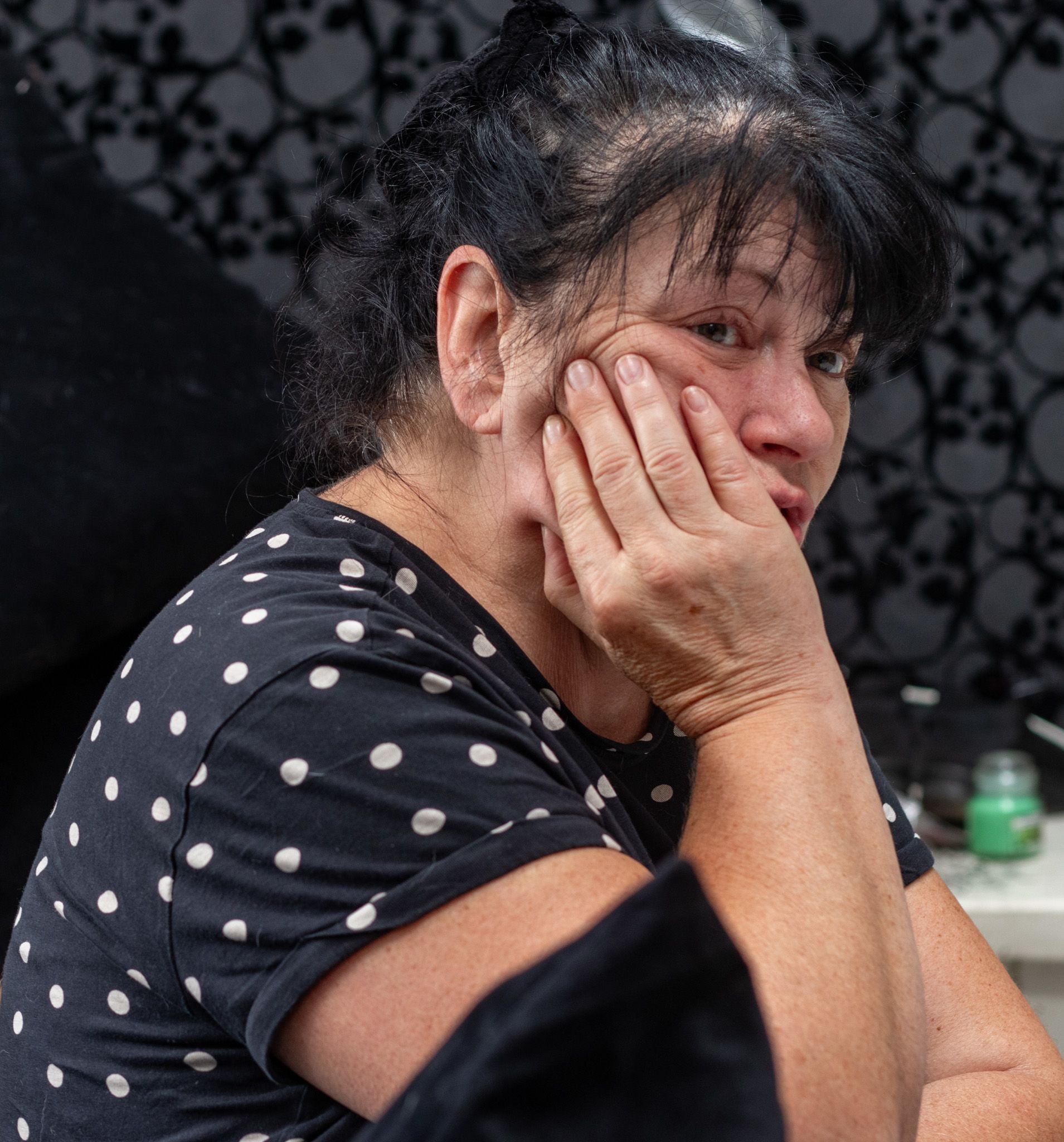
Breaking Point
According to the State of Caring Survey 2025, over 65% of carers say they feel overwhelmed, chiefly because they cannot take a break.
After months of trying to manage alone, Colette finally sought external support. But navigating the care system brought new complications. Exhausted and near burnout, she accepted help from an outside care agency, only for things to quickly spiral.
She reached breaking point when one company labelled her “dangerous” and entered her home without permission. On another occasion, a social worker let themselves in while she was out, then blindsided her with multiple questions about alleged mistakes. Both incidents left Colette feeling unsafe, vulnerable, and exposed.
Colette's experience reflects a wider "perfect storm" as described by Styles, facing many carers across the UK. "There are more carers with physical disabilities, carers on waiting lists for surgery, and carers whose health and wellbeing is already lower than the general population. They're expected to keep caring when there own bodies are giving out," she explains.
The risks are severe. Research by Dr Siobhan O'Dwyer at the University of Birmingham shows thats parent carers experience higher rates of suicidal thoughts than those who have faced combat, a stark reminder of the cost of caring.
The Price of Care
Carers Allowance stands at just £83.30 a week for 35+ hours of care and is often reduced by other benefit deductions. Colette doesn’t claim it: “It would make little difference,” she says. Technically, she could apply, but the money would come out of her uncle’s pension.
Respite, when it happens, is expensive. “Getting someone to look after him for a week so I could stay here would cost two and a half grand.”
NHS Guidance lists respite care costs at £700-£1,500 per week, but emergency 24-hour-live in support can push prices higher. Colette was quoted over £2,500 for round-the-clock in-home care, more than her monthly income.
However, Styles warns that the state is failing to acknowledge the real cost of carers not getting breaks. "It costs far more to replace a carer after they reach breaking point than to fund a weekly or annual break in the first place," she explains. Families are being stretched across multiple caring roles, often splitting households, with single-parent carers facing the steepest pressures.
Lifeline: Amy Steps In
Recently, Colette began receiving ten hours of respite each week from Amy, a paid carer. Though limited, it’s a lifeline.
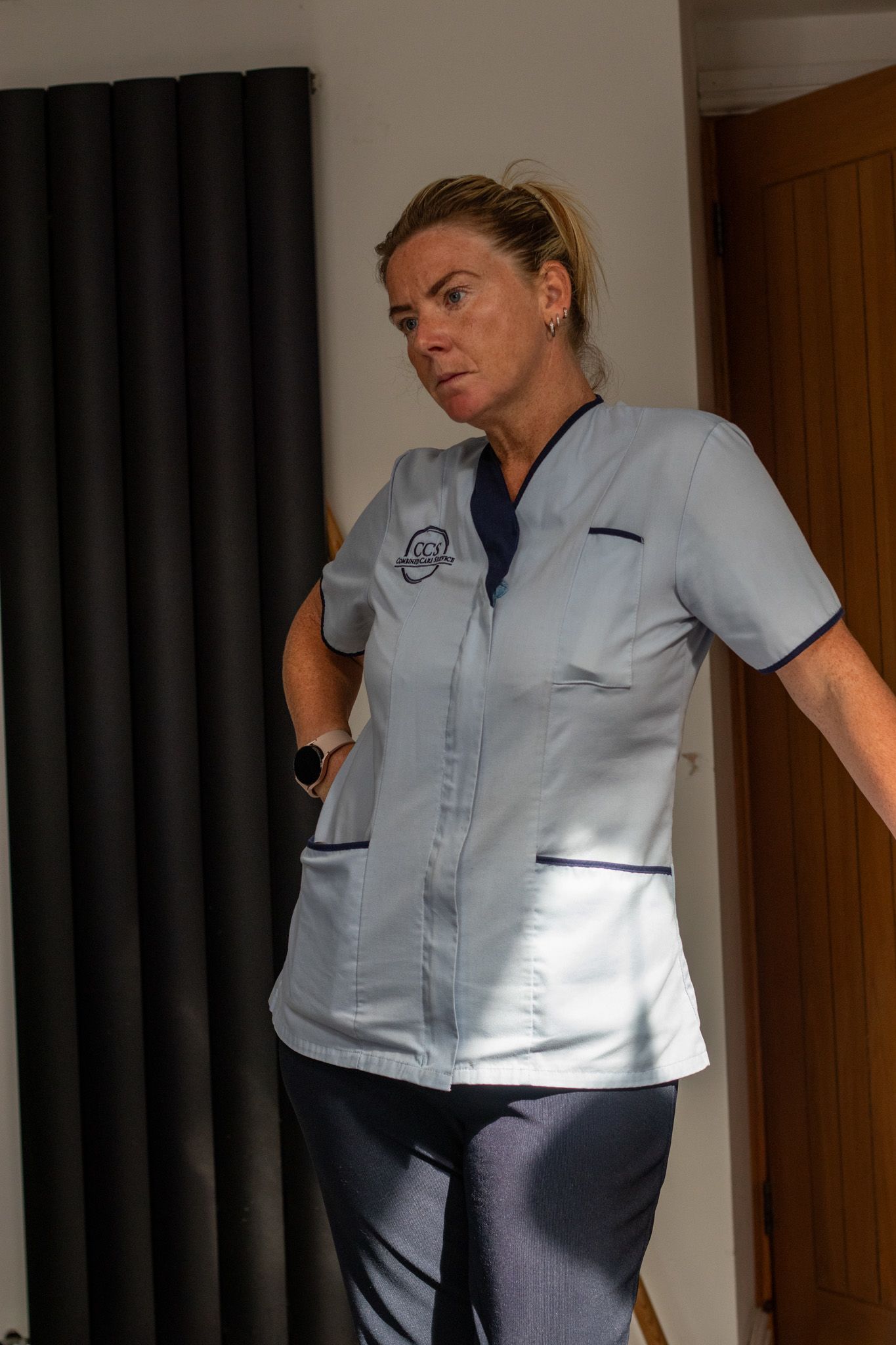
Amy cooks, cleans, and plays games with her uncle. "She might do a puzzle, sit and watch telly with him, even react to his stories.”
Those hours give Colette the needed breathing space to shop, meet friends, or simply be.
57% of unpaid carers report feeling overwhelmed often or always, with over half saying they need more support from councils to take a break. Source: Carers UK, 2025
57% of unpaid carers report feeling overwhelmed often or always, with over half saying they need more support from councils to take a break. Source: Carers UK, 2025
But she dreams of more: “At least one week a year of fully funded in-home care. Respite is peace of mind,” she explains, rest without worry, without wondering how he'll be when she returns. "I feel I am a normal human being,” she says.

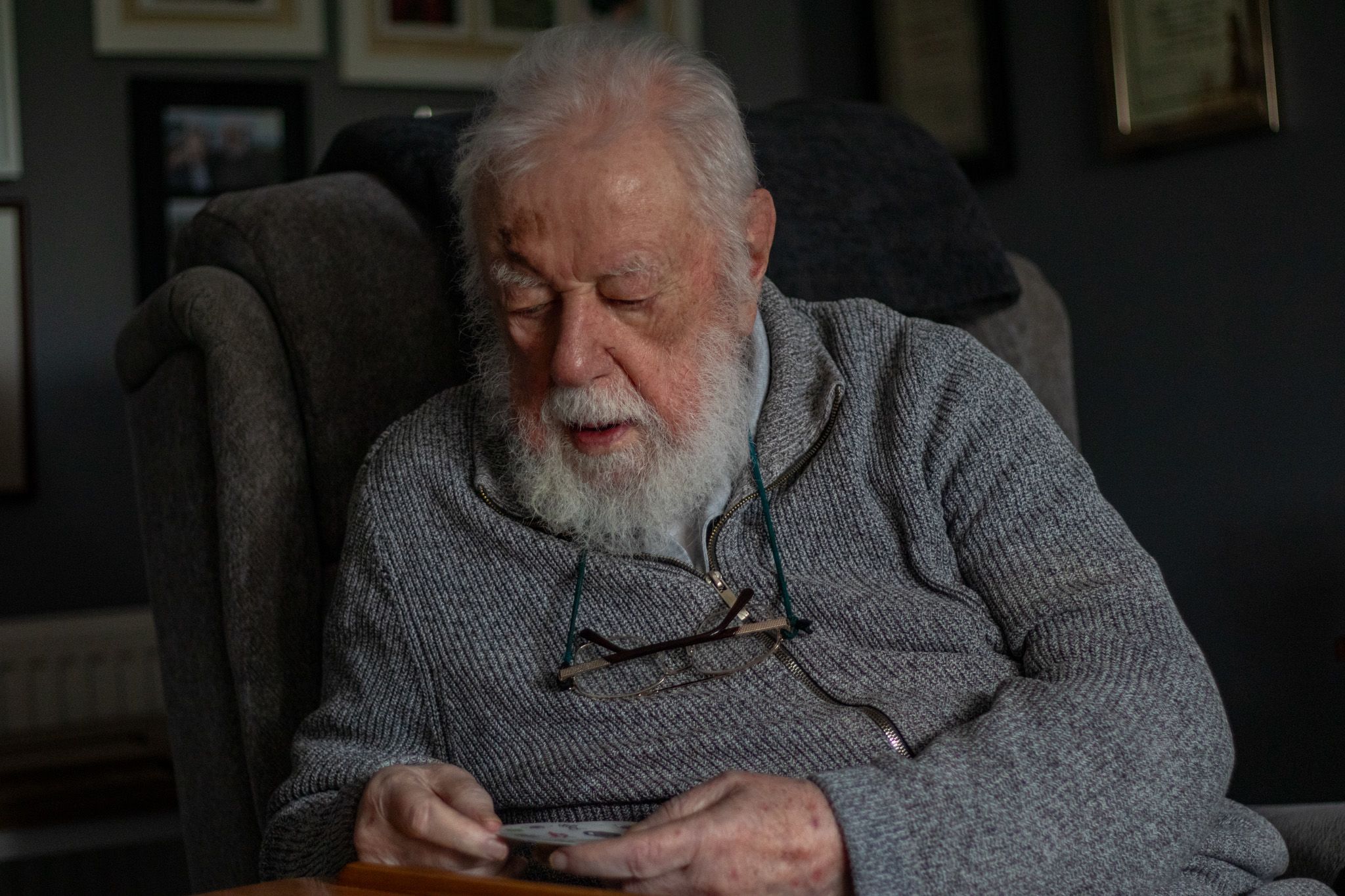
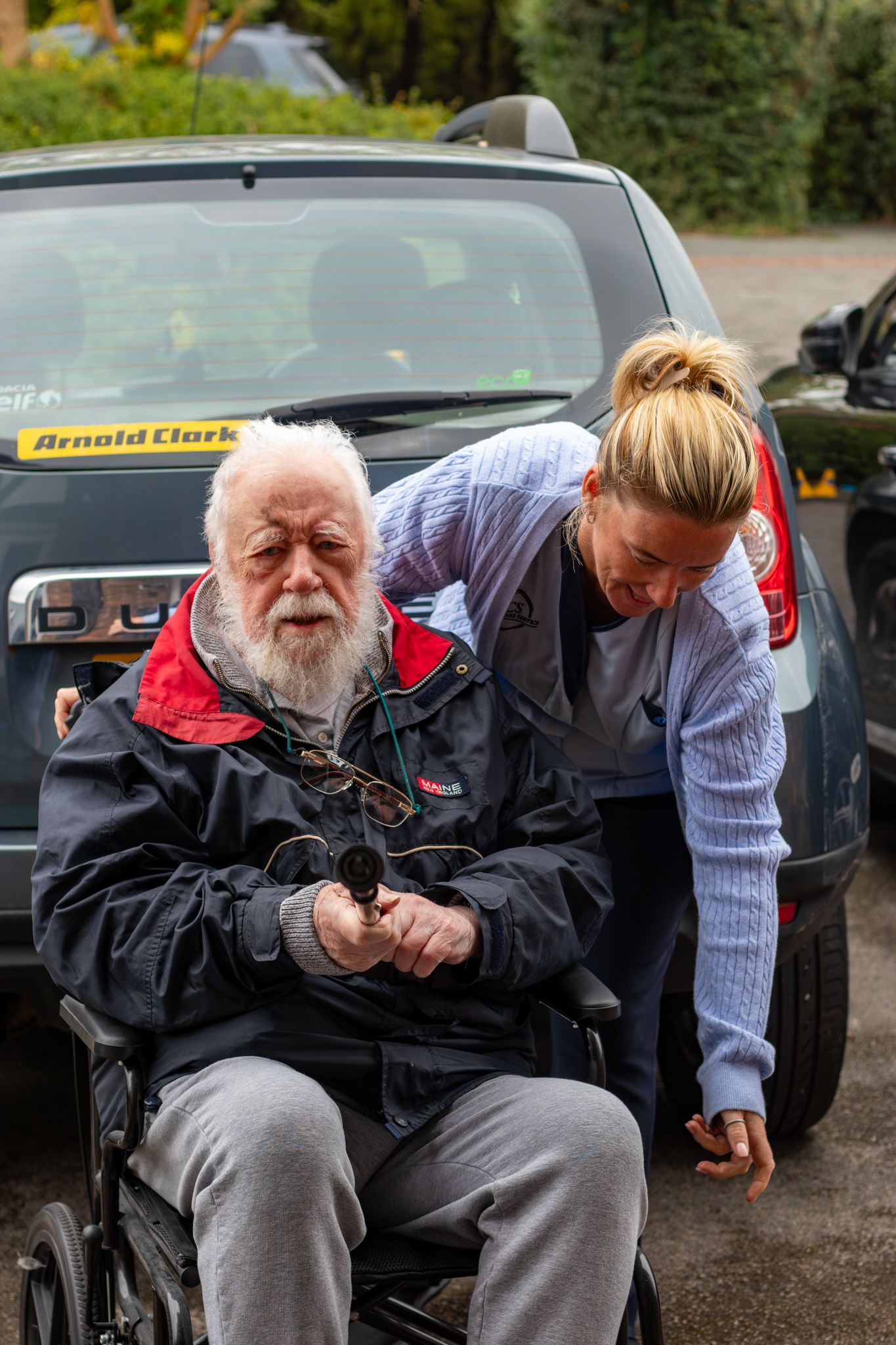
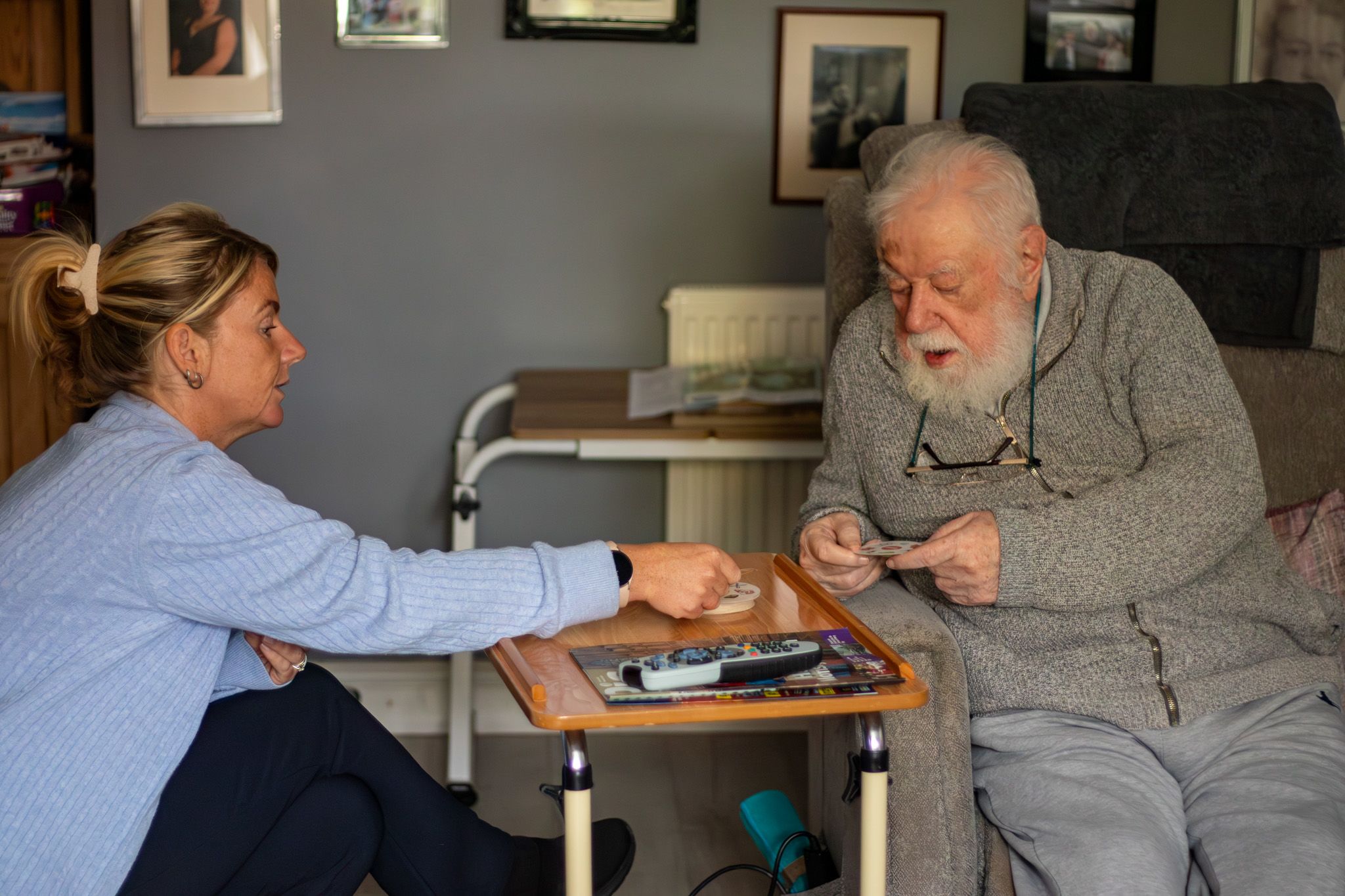
Steps Towards Change
Carer support varies across the UK, with some regions offering more comprehensive and guaranteed respire services, while others rely on limited, means-tested support. This creates uneven access to vital breaks for Carers.
Wales: In 2025/26 the government committed £5.25 million to a Short Breaks Scheme, funding holidays, activity days, or time for hobbies. More than 45,000 carers are expected to benefit. In addition to financial assistance provided through the Carers Support Fund.
Scotland: The Carers (Scotland) Act 2016 requires local authorities to provide advice, information, and a personalised Adult (or young) Carer Support Plans that identify needs, including a right to respite. Carers can also apply to the Time to Live Fund for flexible short breaks.
England: By contrast, respite is means-tested and reliant on overstretched local authority budgets. Access requires multiple assessments and comes at high cost.
Styles argues that nowhere in the UK, has respite "right." Even when money exists, staff shortages and cancellations mean planned breaks can fall through. "What carers need is guaranteed breaks," she says, a right campaigners are pushing through the Carers Trust's "Give Us a Break" Petition.
Taking a Break
Attending the local Pride event gave Colette a rare chance to unwind and momentarily step back from her caring responsibilities. Without a friend stepping in to look after her uncle, it wouldn’t have been possible.
For a few precious hours, she felt like herself again, chatting, laughing, and reconnecting with long-time friends. Instead of clock-watching or worrying about what was happening at home, she could finally relax, knowing he was safe.



A Future Hard to Imagine
For now, Colette’s sofa isn’t a place of rest, but a last refuge in a life consumed by care.
Across the UK, millions of unpaid carers find their own health and well-being hanging in the balance, sacrificed to hold up an overstretched health and social care system. They exist in the background, silent, unseen, amid policy delays, shrinking services, and broken promises, giving up sleep, income, identity, and peace of mind.
“I’m worried about him. I can’t think about the future,” Colette says. “He’s still alive; he’d be dead now if it wasn’t for my care."
Colette, 55, with her Uncle.
Colette, 55, with her Uncle.
Respite is not a luxury; it’s a necessity for carers on the verge of breaking down. Yet in England, the right to respite remains uncertain, unequal, and out of reach for many. The question lingers: how can carers like Colette keep going when they are holding on to so little?
Each night, her uncle quietly repeats the same words before drifting to sleep: “What would I do without you, little one?” For Colette it’s comfort and burden at once, an expression of love as well as the immense weight of dependence and responsibility.
If you're a carer and need support
If you’ve been affected by the experiences shared in this story, help is available. Whether you need emotional support, financial advice, or simply someone to talk to, the following organisations may be able to help:
- Carers UK – Offers expert advice, a helpline, and online support forums.
www.carersuk.org | Helpline: 0808 808 7777 (Mon–Fri, 9am–6pm) - Carers Trust – Provides local support services and grants for unpaid carers.
www.carers.org - Mind – For mental health support, including for carers managing stress or anxiety.
www.mind.org.uk | Infoline: 0300 123 3393 - The Mix – For young carers under 25 needing support.
www.themix.org.uk | Text: THEMIX to 85258 - Citizens Advice – For help navigating benefits like Carer’s Allowance, PIP, or Universal Credit.
www.citizensadvice.org.uk


